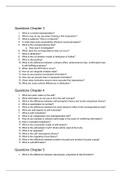Overig
Practice Questions Social Psychology Part 1
These are practice questions with answers at the end of the document about the first 8 chapter of the book Social Psychology by Smith, Mackie and Claypool. My prof gave these questions to study the material for the exam.
[Meer zien]





